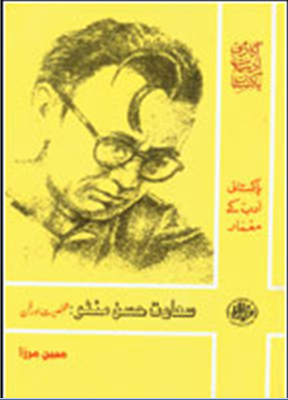Saadat Hasan Manto
This is a collection of articles archived for the excellence of their content. Readers will be able to edit existing articles and post new articles directly |
Saadat Hasan Manto
A Controversial Writer Reviewed By Saba Ekram
Saadat Hasan Manto occupies a conspicuous place among the fiction writers of Urdu. His many admirers remember him as a playwright, a translator and an essayist.
In his latest book on Manto titled Saadat Hasan Manto: Fun Aur Shakhsiyat, Mobin Mirza has devoted separate chapters to discuss Manto’s contributions in various areas apart from his achievements as a short story writer.
Yet another chapter has been added to discuss the issue of his nationality, which remains a controversial subject due to faulty interpretation by some Indian writers like Musharraf Alam Zauqui and Khem Chand. Mobin Mirza is very critical of both of them and has tried to prove that Manto was not opposed to the idea of partition. He has referred to Dr Fateh Mohammad Malik’s interpretation of Toba Tek Singh which supports his contention.
India’s official TV channel too seems to be affected by the same prejudice in this regard. In Doordarshan’s dramatisation of Toba Tek Singh a few years back, Manto was badly misinterpreted. The point of view of the main character (Bishan Singh) on Partition, as presented in the play, was altogether different from what was actually portrayed in the original story.
It is immaterial whether a writer is Pakistani or Indian, more so when he is a humanist and his creative pieces aim to foster brotherhood between the peoples of the two neighbouring countries.
Like our classical writers — Meer, Ghalib, Zauq and even Iqbal, progressive writers too should be regarded as the joint heritage of both Pakistan and India. What globalisation is trying to do today in the economic sphere, literature did much earlier. Centuries ago it broke all geographical boundaries for art and literature.
In the chapter titled Manto Ke Afsanay, the writer has made an in-depth study of some of his stories and in certain cases he has even reinterpreted them. He differs with Waris Alvi’s views with particular reference to his analysis of Zard Kutta.
Discussing Manto’s art of story-telling, Mirza thinks that he assimilated the complexities of the themes and the characters before turning them into art.
However, he has praised Mumtaz Sheerin and Dr Fateh Mohammad Malik’s assessment of Manto as carried out in their books Manto Nari Na Noori and Manto Ek Mutalia, respectively. Mirza also differs with yet another literary giant, Syed Hasan Askari, on the evaluation of Siyah Hashiay. He says Askari has overrated the pieces that, in fact, are of purely journalistic in nature and lack any creative touch.
Mirza maintains that controversies surrounding Manto’s personality lifted him to a height where no other Urdu short story writer had reached before. He is of the view that Manto is still controversial and will remain so in the years to come. There are two camps of his admirers — one hails him as a unique storyteller while the other criticises him for his ruthlessness as a realist.
Discussing Manto’s art of story-telling, Mirza thinks that he assi-milated the complexities of the themes and the characters before turning them into art.
Howsoever complex the themes and characters, in the hands of Manto they became simple and highly communicative. Another reason that his stories were not nebulous is that he used the vocabulary used by people around him.
Like other progressive fiction writers Manto too practiced realism, but in the making of a short story he developed his own creative method. Thematically too his realism goes far beyond the social inequality and social injustice and focuses on the complex problem of sex.
To the writer, Manto was a realist in the true sense. The characters he shaped are quite natural and free from any kind of artificiality. This shows that he was honest in their portrayal. However, some people did not admire this particular aspect of his work and they accused him of indulging in obscenity.
This is a research-based and insightful book.
Saadat Hasan Manto: Shakhsiyat Aur Fan By Mobin Mirza Printed by Pakistan Academy of Letters, Islamabad. ISBN: 978-969-472-164-4 228pp. Rs220
